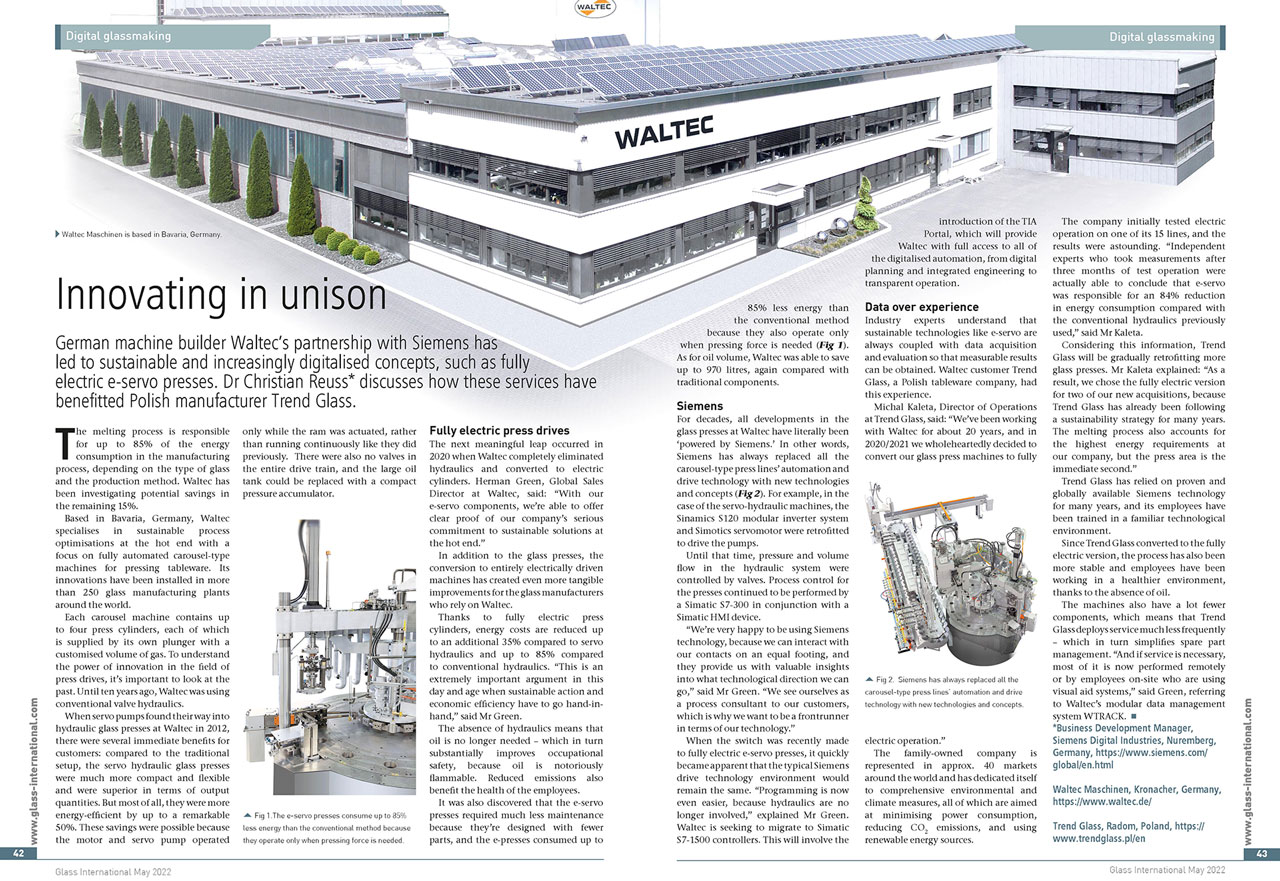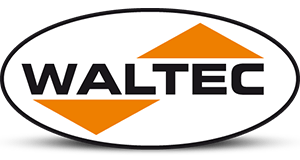
![]()
Published in Glass International May 2022:
Innovating in unison
German machine builder Waltec’s partnership with Siemens has led to sustainable and increasingly digitalised concepts, such as fully electric e-servo presses. Dr. Christian Reuss* discusses how these services have benefitted Polish manufacturer Trend Glass.
The melting process is responsible for up to 85% of the energy consumption in the manufacturing process, depending on the type of glass and the production method. Waltec has been investigating potential savings in the remaining 15%.
Based in Bavaria, Germany, Waltec specialises in sustainable process optimisations at the hot end with a focus on fully automated carousel-type machines for pressing tableware. Its innovations have been installed in more than 250 glass manufacturing plants around the world.
Each carousel machine contains up to four press cylinders, each of which is supplied by its own plunger with a customised volume of gas. To understand the power of innovation in the field of press drives, it’s important to look at the past. Until ten years ago, Waltec was using conventional valve hydraulics.
When servo pumps found their way into hydraulic glass presses at Waltec in 2012, there were several immediate benefits for customers: compared to the traditional setup, the servo hydraulic glass presses were much more compact and flexible and were superior in terms of output quantities. But most of all, they were more energy-efficient by up to a remarkable 50%. These savings were possible because the motor and servo pump operated only while the ram was actuated, rather than running continuously like they did previously. There were also no valves in the entire drive train, and the large oil tank could be replaced with a compact pressure accumulator.
Fully electric press drives
The next meaningful leap occurred in 2020 when Waltec completely eliminated hydraulics and converted to electric cylinders. “With our e-servo components, we’re able to offer clear proof of our company’s serious commitment to sustainable solutions at the hot end.”
In addition to the glass presses, the conversion to entirely electrically driven machines has created even more tangible improvements for the glass manufacturers who rely on Waltec.
Thanks to fully electric press cylinders, energy costs are reduced up to an additional 35% compared to servo hydraulics and up to 85% compared to conventional hydraulics. “This is an extremely important argument in this day and age when sustainable action and economic efficiency have to go hand-in-hand,”.
The absence of hydraulics means that oil is no longer needed – which in turn substantially improves occupational safety, because oil is notoriously flammable. Reduced emissions also benefit the health of the employees.
It was also discovered that the e-servo presses required much less maintenance because they’re designed with fewer parts, and the e-presses consumed up to 85% less energy than the conventional method because they operate only when pressing force is needed (Fig 1). As for oil volume, Waltec was able to save up to 970 litres, again compared with traditional components.
Siemens
For decades, all developments in the glass presses at Waltec have literally been ‘powered by Siemens.’ In other words, Siemens has always replaced all the carousel-type press lines’ automation and drive technology with new technologies and concepts (Fig 2). For example, in the case of the servo-hydraulic machines, the Sinamics S120 modular inverter system and Simotics servomotor were retrofitted to drive the pumps.
Until that time, pressure and volume flow in the hydraulic system were controlled by valves. Process control for the presses continued to be performed by a Simatic S7-300 in conjunction with a Simatic HMI device.
“We’re very happy to be using Siemens technology, because we can interact with our contacts on an equal footing, and they provide us with valuable insights into what technological direction we can go,”. “We see ourselves as a process consultant to our customers, which is why we want to be a frontrunner in terms of our technology.”
When the switch was recently made to fully electric e-servo presses, it quickly became apparent that the typical Siemens drive technology environment would remain the same. “Programming is now even easier, because hydraulics are no longer involved,”. Waltec is seeking to migrate to Simatic S7-1500 controllers. This will involve the introduction of the TIA Portal, which will provide Waltec with full access to all of the digitalised automation, from digital planning and integrated engineering to transparent operation.
Data over experience
Industry experts understand that sustainable technologies like e-servo are always coupled with data acquisition and evaluation so that measurable results can be obtained. Waltec customer Trend Glass, a Polish tableware company, had this experience.
Michal Kaleta, Director of Operations at Trend Glass, said: “We’ve been working with Waltec for about 20 years, and in 2020/2021 we wholeheartedly decided to convert our glass press machines to fully electric operation.” The family-owned company is represented in approx. 40 markets around the world and has dedicated itself to comprehensive environmental and climate measures, all of which are aimed at minimising power consumption, reducing CO2 emissions, and using renewable energy sources. The company initially tested electric operation on one of its 15 lines, and the results were astounding. “Independent experts who took measurements after three months of test operation were actually able to conclude that e-servo was responsible for an 84% reduction in energy consumption compared with the conventional hydraulics previously used,” said Mr Kaleta.
Considering this information, Trend Glass will be gradually retrofitting more glass presses. Mr Kaleta explained: “As a result, we chose the fully electric version for two of our new acquisitions, because Trend Glass has already been following a sustainability strategy for many years. The melting process also accounts for the highest energy requirements at our company, but the press area is the immediate second.”
Trend Glass has relied on proven and globally available Siemens technology for many years, and its employees have been trained in a familiar technological environment.
Since Trend Glass converted to the fully electric version, the process has also been more stable and employees have been working in a healthier environment, thanks to the absence of oil.
The machines also have a lot fewer components, which means that Trend Glass deploys service much less frequently – which in turn simplifies spare part management. “And if service is necessary, most of it is now performed remotely or by employees on-site who are using visual aid systems,”, referring to Waltec’s modular data management system WTRACK.
*Business Development Manager, Siemens Digital Industries, Nuremberg, Germany, www.siemens.com global/en.html
Waltec Maschinen, Kronacher, Germany, www.waltec.de
Trend Glass, Radom, Poland, www.trendglass.pl/en

WNEWS – Update your competences
Join WNEWS INNOVATIONS and stay up to date with our latest technologies! Strengthen your business competence, benefit from special offers and discover the next level of productivity and maximum efficiency!

 English
English Dansk
Dansk Español
Español پارسی
پارسی Français
Français हिन्दी; हिंदी
हिन्दी; हिंदी Italiano
Italiano 日本語
日本語 한국어
한국어 Polski
Polski Română
Română Русский
Русский Slovenščina
Slovenščina Svenska
Svenska 中文(简体)
中文(简体)